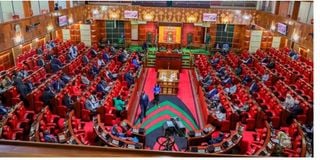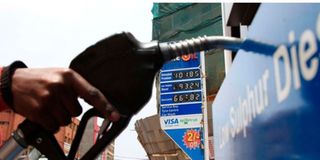Premium
Tighten your belt as MPs endorse 16pc VAT on fuel

Members of the National Assembly during a sitting on June 7, 2023. Kenyans will from July 1 be forced to tighten their belts some more after Kenya Kwanza MPs bulldozed their way and raised the tax on fuel from eight to 16 per cent as proposed in the Finance Bill, 2023.
Kenyans will from July 1 be forced to tighten their belts some more after Kenya Kwanza MPs bulldozed their way and raised the tax on fuel from eight to 16 per cent as proposed in the Finance Bill, 2023.
The ruling coalition MPs used their numerical strength to defeat a spirited opposition by Azimio legislators.
Out of the 272 MPs who were present and voting, 184 Kenya Kwanza MPs voted to approve the increase of tax on petroleum products while 88 Azimio lawmakers voted against it.
The bullish Kenya Kwanza MPs had been emboldened by an earlier ruling by National Assembly Speaker Moses Wetang’ula who barred any changes to clause 28 that increases the VAT on petroleum products.
He ruled that changes to a Money Bill which imposes taxes can only proceed after taking into account the views of the Cabinet Secretary responsible for finance in line with Article 114 of the Constitution.
This effectively blocked the opposition from proposing any changes to the clause.
The Finance Bill, 2023 increases the tax on petroleum products like petrol, diesel and kerosene from the current eight per cent to 16 per cent as part of the government's efforts to raise more revenue to finance President William Ruto’s Sh3.6 trillion budget.
The Treasury projects that VAT collections will double to an estimated Sh128.98 billion annually or Sh10.7 billion per month. This, however, depends on fuel consumption and global prices of crude oil.
An increase in VAT on petroleum products will hit homes, farmers and businesses that are already grappling with the high cost of living.
Minority Leader Opiyo Wandayi and Minority Whip Junet Mohamed warned Kenya Kwanza regime to prepare for mass demonstrations, a possible uprising and the eventual collapse of Dr Ruto’s administration.

An attendant at a Nyeri petrol station prepares to fill up a car in August 2020. The Finance Bill, 2023 increases the tax on petroleum products like petrol, diesel and kerosene from the current eight per cent to 16 per cent as part of the government's efforts to raise more revenue to finance President William Ruto’s Sh3.6 trillion budget.
“This is the most offensive clause in the Finance Bill, 2023. If you increase VAT on fuel from eight to 16 per cent, it will make life unbearable for Kenyans,” Mr Mohamed said.
“Let us all agree to remove this increase of tax on petroleum products. Otherwise, I promise you today that there will be a revolution in this country.”
Mr Wandayi predicted the fall of Dr Ruto’s regime.
“If by any chance and God forbid that this Bill is passed to increase VAT on petroleum to 16 per cent, it will mark the fall of this regime,” Mr Wandayi said.
Government defence
Majority Leader Kimani Ichung’wah dismissed the opposition’s claims on the VAT increase, saying the government has cushioned Kenyans through the reduction of the Import Declaration Fee from 3.5 per cent to 2.5 per cent of the customs value of imported goods and Railway Development Levy from 2.5 per cent to 1.5 per cent.
“We should not be worried when others prophesy the fall of a regime. I agree that a rise in VAT on petroleum products will cause a rise in prices. But 16 per cent VAT on petroleum products in the country is the least in the East African region,” Mr Ichung’wah said, giving the example of Tanzania, Uganda and Rwanda whose VAT is at 18 per cent.
Dr Ruto has defended the increase, arguing that higher levies will provide the much-needed cash to fund development projects.
The increased rate of VAT on petroleum products was done through an amendment to section 5 of the VAT Act.

National Assembly Majority Leader Kimani Ichung’wah. Mr Ichung’wah dismissed the opposition’s claims on the VAT increase, saying the government has cushioned Kenyans through the reduction of the Import Declaration Fee from 3.5 per cent to 2.5 per cent of the customs value of imported goods and Railway Development Levy from 2.5 per cent to 1.5 per cent.
VAT on petroleum products was introduced by the Finance Act of 2018 at a reduced VAT rate of eight per cent, which was aimed at cushioning the economy from the adverse effect of the government’s decision to levy VAT on petroleum products.
Yesterday, nominated MP John Mbadi, an expert in public finance, said having VAT on petroleum products at eight per cent did not come easy.
“We in the then Nasa coalition lobbied the immediate former President Uhuru Kenyatta, who was pushing for 16 per cent, to see the sense of reducing it to cushion Kenyans,” said Mr Mbadi.
Mathare MP Antony Oluoch said the increase will affect the cost of transport, and electricity and put Kenyans who are suffering in a precarious situation.
“This will increase pump prices by more than Sh13 per litre and this will raise the cost of living which President Ruto promised to bring down,” Embakasi West MP Mark Mwenje said.
Githunguri MP Gathoni Wamuchomba (UDA), Kitui Central MP Makali Mulu (Wiper), Mishi Mboko (Likoni, ODM), Homa Bay Woman Rep Gertrude Bensouda, Kilifi Woman Rep Gertrude Mbeyu said the doubling of the VAT on petroleum products has come at the wrong time and must be reversed.
“If you increase VAT on petroleum to 16 per cent, how will mama mboga get to the market when fares go up? How will boda bode fuel their motorbikes? ” Ms Mbeyu posed.
Budget and Appropriations Committee chairman Ndindi Nyoro and a host of Kenya Kwanza MPs dismissed the opposition’s assertions. “This is hypocrisy because when we approved the Budget Estimates, all Azimio MPs did not have an issue while passing the budget as you lobbied for development projects,” Mr Nyoro said.
He said in the 2023/24 budget, Sh25 billion has been allocated to clear pending bills for fuel subsidy promised by the previous regime and a further Sh250 billion towards road construction across the country. “You can’t have your cake and eat it. If you want good roads, money must come from somewhere,” Mr Nyoro said.
Chuka-Igambang’ombe MP Patrick Munene said the House cannot pass the budget without issues and come and amend the Finance Bill.





